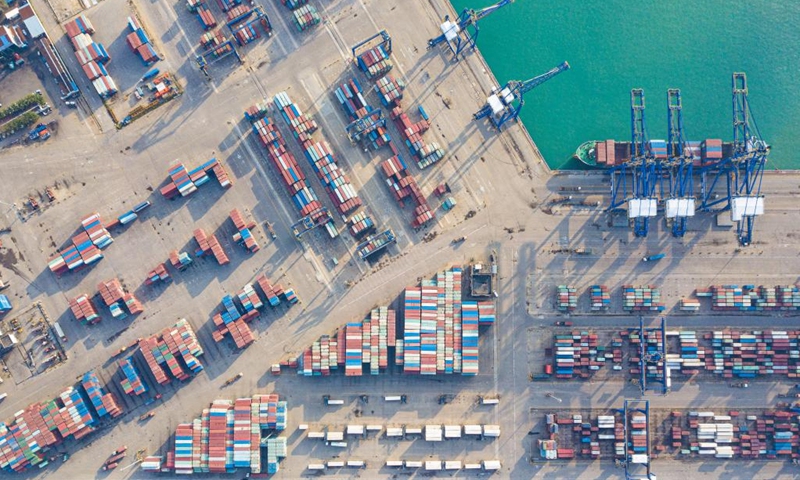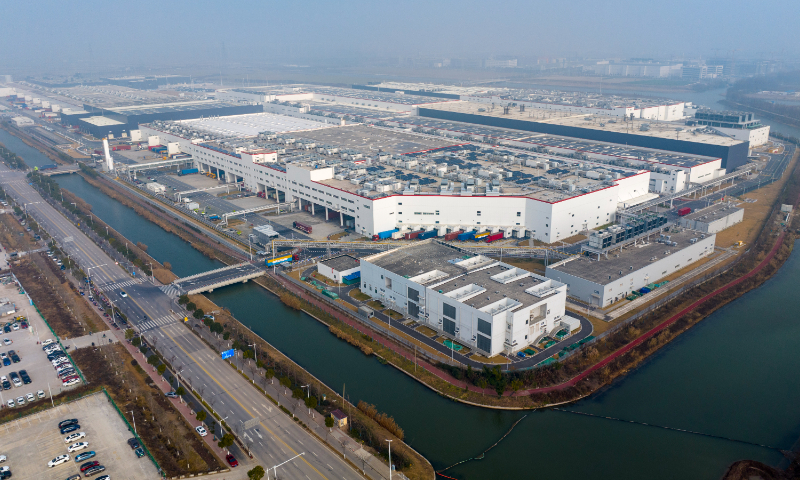
This aerial photo taken on Jan. 13, 2023 shows a view of the container terminal of Haikou Port in Haikou, south China's Hainan Province. After exceeding 100 billion yuan (about $14.92 billion) for the first time in 2021, the total import and export value of Hainan Free Trade Port exceeded 200 billion yuan (about $29.84 billion) to reach 200.95 billion yuan (about $29.98 billion) in 2022, an increase of 36.8 percent. (Xinhua/Pu Xiaoxu)
China's market regulator on Wednesday unveiled 40 specific measures for optimizing the business environment to reach international standards, attract more foreign investment and better serve foreign-invested enterprises operating in China.
The move comes as China has made optimizing the business environment a top priority. Earlier, many locations in China responded positively to improve the cross-border business climate and jointly promote the high-quality opening-up of the China market.
The State Administration for Market Regulation (SAMR) released the draft Key Measures for Market Regulation Departments to Optimize the Business Environment 2024 Edition, containing 10 sections and 40 specific measures, to solicit public comment.
Among the 40 measures, the SAMR pledged to continue enhancing the registration management of foreign-invested enterprises, giving full play to the role of pilot free trade zones and enhancing the foreign-invested enterprise data management platform for better data analysis.
The SAMR said that improving the business environment is an important measure to counter the downward pressure on the economy and boost the confidence of business entities. It is also a necessity to attract foreign investment and promote a higher level of opening-up.
Local governments have introduced action plans to enhance their international business climates. South China's Hainan Province, for example, on May 23 released its action plan, aiming at simplifying registration for foreign investors.
In March, the State Council, China's cabinet, issued an action plan to steadily promote high-level opening-up and make greater efforts to attract and utilize foreign investment. China will create a market-oriented, law-based and internationalized first-class business environment that will boost foreign investors' confidence in their ability to develop in China, the action plan stated.
China is not simply opening up to the outside world, but is doing so with a high standard, Cong Yi, a professor at the Tianjin University of Finance and Economics, told the Global Times on Wednesday.
"China's measures to optimize foreign investment in recent years show that the country is working toward internationalization, legalization and marketization, and it has achieved a high level of internationalization in attracting foreign investment," said Cong.
China continues to improve its business climate, which makes the domestic market environment match international standards, and speeds up contact with the international market so that confidence and trust from foreign-invested enterprises will increase, Li Chang'an, a professor at the Academy of China Open Economy Studies of the University of International Business and Economics, told the Global Times on Wednesday.
"We should be optimistic that China will open wider and wider. At present, China's manufacturing sector is fully open to the outside world. In the future, China's services sector and agriculture sector are also likely to open further to foreign enterprises, and thus China will attract more foreign investment," said Li.
Li also called for more policy support in promoting international cooperation, on the basis of self-reliance, especially in high-tech industries where Western countries have imposed restrictive measures against China.
But analysts also noted that the China market has huge potential and is bound to be an indispensable market in the world, given the promising outlook of the country's future development. Giving up on the China market will be a huge loss for any multinational.
More foreign-invested enterprises are coming to China and many of those that are already operating in China are expanding their investment, showing the attractiveness of China's market, analysts noted.
There are many examples. One of the latest examples is Tesla, whose
Shanghai Megapack energy storage plant broke ground on May 23, producing energy storage batteries known as Megapacks. This is Tesla's first energy storage factory outside the US, another major investment for Tesla in China following the inauguration of its Shanghai Gigafactory in 2019.

Photo taken on December 31, 2023 shows the Tesla Shanghai Gigafactory. More than half of the over 1.8 million electric vehicles Tesla globally delivered in 2023 came from the Shanghai plant. Photo: VCG
Apple in March announced that it will open a new research and development (R&D) center in Shenzhen, South China's Guangdong Province and upgrade its Shanghai R&D center to support product manufacturing.
Also in March, German technology group Bosch started construction of the second phase of a production base for new-energy vehicle components and a self-driving R&D center in Suzhou, East China's Jiangsu Province. The first phase completed construction in November 2023, and it is set to begin trial production in September and realize mass production in early 2025.





